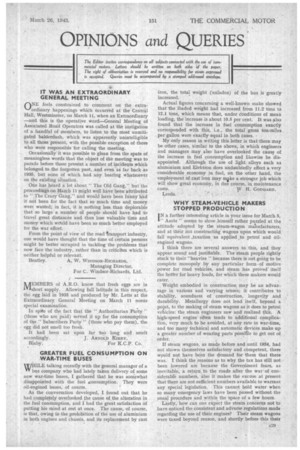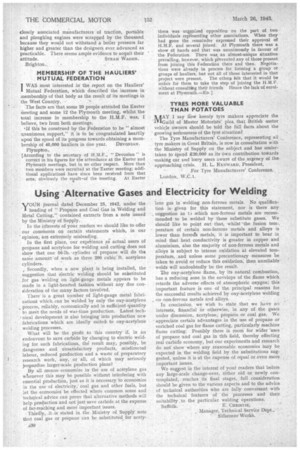OPINIONS and QUERIES The Editor invites correspondence on all subjects
Page 31

Page 32

If you've noticed an error in this article please click here to report it so we can fix it.
connected with the use of commercial motors. Letters should be written on both sides of the paper. The right of abbreviation is reserved and no responsibility for views expressed is accepted. Queries must be accompanied by a stamped addressed envelope.
IT WAS AN EXTRAORDINARY GENERAL MEETING ONE feels constrained to comment on the extra
ordinary happenings which occurred at the Central Hall, Westminster, on March 11, when an Extraordinary —and this is the operative Word—General Meeting of Associated Road Operators was called at the instigation of a handful of members, to listen to the most unmitigated balderdash, which was apparently unintelligible to all those present, with the possible exception of those who were responsible for calling the meeting.
Occasionally it was possible to glean from the spate of meaningless words that the object of the meeting was to parade before those present a number of incidents which belonged to the forgotten past, and even as far back as 1935, but none of which had any bearing whatsoever on the existing situation.
One has heard a lot about " The Old Gang," but the proceedings on March 11 might well have been attributed to " The Crazy Gang," and would have been funny had it not been for the fact that so much time and money were wasted; in fact, it is nothing less than deplorable that so large a number of people should have had to travel great distances and thus lose valuable time and money which wauld have been so much better employed for the war effort.
From the point of view of the road transport industry, one would have thought that the time of certain persons might be better occupied in tackling the problems that now face the industry, rather than in criticism which is neither helpful or relevant.
Bentley. A. W. Wnwson-RIcnAans, Managing Director, For C. Windsor-Richards, Ltd.
MEMBERS of A.R.O. know that fresh eggs are in IVIshort supply. Allowing full latitude in this respect, the egg laid in 1935 and produced by Mr. Letts at the Extraordinary General Meeting on March 11 neeas special examination.
In spite of the fact that the " Authoritarian Party " (those who are paid) served it up for the consumption of the "Subscribers Party" (those who pay them), the egg did not smell too fresh.
It had been sat upon far too long and smelt accordingly. J. ARNOLD KIRBY, Blaby. For K.C.P. Co.
GREATER FUEL CONSUMPTION ON WAR-TIME BUSES WHILE talking recently with the general manager of a VV bus company who had lately taken delivery of some new war-time buses, I gathered that he was somewhat disappointed with the fuel consumption. They were oil-engined buses, of course.
As the conversation developed, I found out that he had completely overlooked he cause of the alteration in the fuel consumption, and I had the great satisfaction of putting his mind at rest at once. The cause, of course, is that, owing to the prohibition of the use of aluminium in both engines and chassis, and its replacement by cast iron, the total weight (unladen) of the bus is greatly increased.
Actual figures concerning a well-known make showed that the loaded weight had increased from 11.2 tons to 12.1 tons, which means that, under conditions of mean loading, the increase is about 10.5 per cent. It was also found that the increase in fuel consumption exactly corresponded with this, i.e., the total gross ton-miles per gallon were exactly equal in both cases.
My only reason in writing this letter is that there may be other cases, similar to the above, in which engineers and managers may also have overlooked the cause of the increase in fuel consumption and likewise be disappointed. Although the use of light alloys such as aluminium and Elektron does undoubtedly effect a very considerable economy in fuel, on the other hand, the employment of cast iron may mike a stronger job which will show great economy, in due course, in maintenance costs. W H. GODDARD. Leeds.
WHY STEAM-VEHICLE MAKERS STOPPED PRODUCTION I N a further interesting article in your issue for March 5, " Azote " seems to show himself rather puzzled at the attitude adopted by the steam-wagon manufacturers, and at their not constructing wagons upon which would fall equivalent _taxation as applied to petrol and oilengined wagons.
I think there are several answers to this, and they appear sound and justifiable. The steam people rightly stuck to their "heavies " because there is not going to be complete monopoly by any particular form of motive power for road vehicles, and steam has proved itself the better for heavy loads, for which these makers would cater.
Weight embodied in construction may be an advantage in various and varying senses; it contributes to stability, soundness of construction, longevity and durability. Metallurgy does not lend itself, beyond a point, to the making of steam wagons as it does to petrol vehicles: the steam engineers saw and realized this. A high-speed engine often tends to additional complication, very much to be avoided, at any rate in war-time, and too many technical and automatic devices make up a greater number of wearing parts possi6le to get out of order.
If steam wagons, as made before and until 1934, had not shown themselves satisfactory and competent, there would not have been the demand for them that there was. I think the reasons as to why the tax has still not been lowered are because the Government fears, as inevitable, a return to the roads after the war of considerable numbers, also it makes the excuse at present that there are not sufficient numbers available to warrant any special legislation. This cannot hold water when so many emergency laws have been passed without the usual procedure and within the space of a few hours. Lastly, how can one expect the steam concerns not to have noticed the consistent and adverse regulations made regarding the use of their engines? Their steam wagons were taxed beyond reason, and shortly before this their
closely associated manufacturers of traction, portable•and ploughing engines were scrapped by the thousand
because they would not withstand a boiler pressure far higher and greater than the designers ever advanced as practicable. There seems ample evidence to acquit their '
attitude. STEAM WAGON.
Brighton., `
MEMBERSHIP OF THE HAULIERS' MUTUAL FEDERATION IWAS most interested in the report on the Hauliers' I Mutual Federation, which described the increase in membership of that body as the result of its meetings in the West Country.
The facts are that some 20 people attended the Exeter 'beefing and some 12 the Plymouth meeting, whilst the total increase in membership to the H.M.F. was, I believe, two from both meetings.
'If this be construed by the Federation to be " almost unanimous, support," it is to be congratulated heartily upon the speed of its progress towards obtaining a mem
bership of 40,000 hauliers in One year. DEVONIAN. Plympton.
[According to' the secretary of H.M.F., " Devonian " is correct in his figures for the attendance at the Exeter and Plymouth meetings, but in no other respect. More than -two members were recruited at the Exeter meeting; additional application i have since been received from that area, obviously the re:ult•of the meeting. At Exeter there was organized opposition on the part of two individuals representing other associations. When they had gone the remainder expressed their approval of H.M.F. and several joined. At Plymouth there was a show di hands and that was unanimously in favour of the Federation. There was an almost-unique situation prevailing, however, which prevented any of those present from joining this Federation there and then. Negotiations were already in process for forming a group or groups of hauliers, but not all of those interested in that project were present. The others felt that it would be unfair for them to take the step of joining the H.M.P. without consalting their friends Hence the lack of enrolment at Plymouth.—En.]
TYRES MORE VALUABLE • THAN POTATOES IUTAY I say Sow keenly tyre makers appreciate the
• LVIGuild of Master Motorists plea, that British motor vehicle owners should be told the full facts about the ' growing seiiousness of the tyre situation?.
The Tyre Manufacturers' Conference, representing all tyre makers in Great Britain, is now in consultation with the Ministry of Supply on the subject and has undertaken to ipead 220,000 as its Own contribution towards -making car and lorry users aware of the.urgency of theapproaching crisis. H. L. KENWARD, President,
' For Tyre Manufacturers' Conference. London, W.C.I.




















































